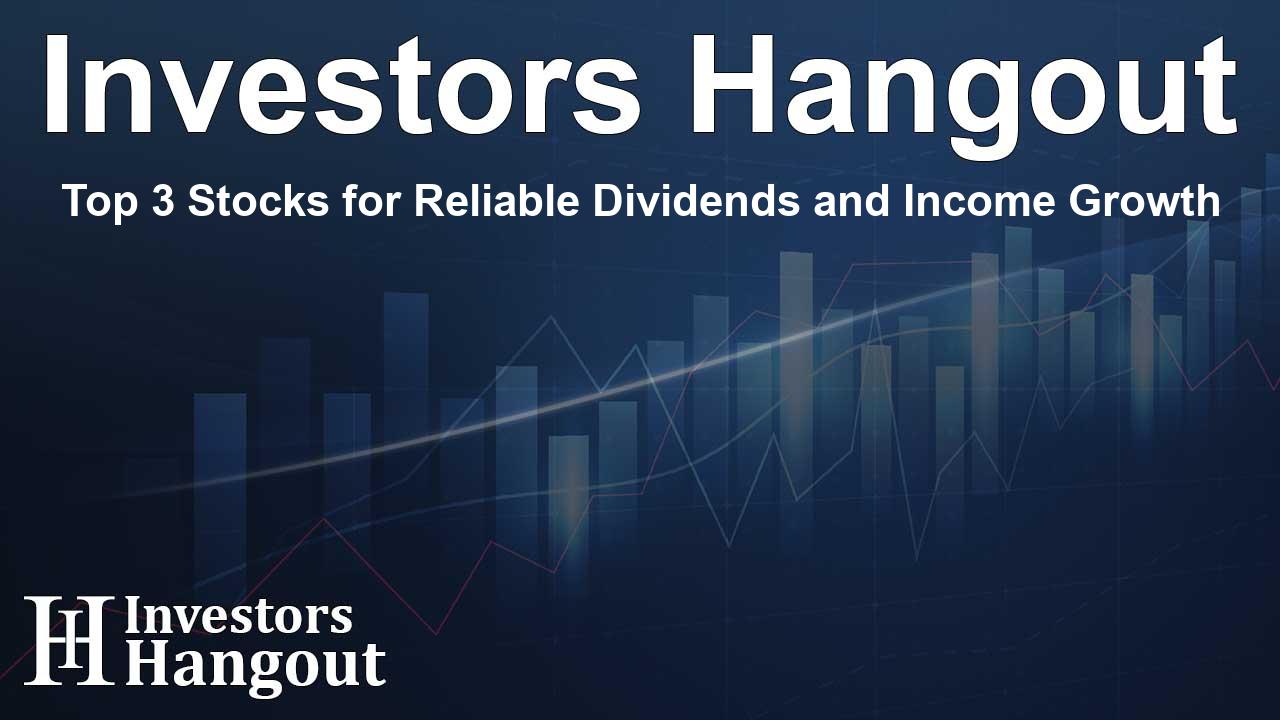Top 3 Stocks for Reliable Dividends and Income Growth

Understanding Dividend Growth and Its Importance
Dividend growth signals a company's health and resilience, offering investors the promise of consistent and increasing passive income. Typically, sectors such as utilities and consumer staples are known for stable dividend payouts. However, assessing dividend yield and payout ratio is crucial in evaluating a company's commitment to sustaining its dividends.
For firms that offer dividends, maintaining a consistent growth rate in these payments indicates a strong foundation and profitability. Dividend growth appeals to investors, enhancing their income through strategic stock ownership. Additionally, many investors view dividend growth as a pivotal element that can influence a company's stock price, especially within models such as the dividend discount model.
The Cigna Group (NYSE: CI)
Significant Dividend Growth Potential
The Cigna Group (NYSE: CI) stands out in the health services and insurance sector, boasting an impressive annualized dividend payout of $5.60. Even though its dividend yield is relatively low at 1.65%, its annualized three-year dividend growth rate has skyrocketed by nearly 400%. This remarkable growth demonstrates the company’s robust financial health.
Moreover, Cigna maintains a sustainable payout ratio of just under 46%, highlighting its ability to distribute dividends without jeopardizing its earnings. Analysts largely consider its shares undervalued, with potential growth of approximately 16% based on expert price estimates. With roots tracing back over 200 years, Cigna embodies the reliability characteristic of blue-chip stocks.
CDW Corp. (NASDAQ: CDW)
A Strong History of Dividend Gains
CDW Corp. (NASDAQ: CDW) is a leader in IT services and recently declared a quarterly dividend of 62 cents—significantly higher than the same period five years ago and an impressive tenfold increase from a decade past. The company’s solid history of increasing dividends is complemented by an attractive payout ratio of 30.96%, assuring investors of its effective management of dividend distributions.
Driven by a robust earnings history, CDW is projected to see earnings growth of approximately 9.0%. Despite facing revenue declines due to broader challenges within the IT sector, the company has successfully improved its gross margin, positioning itself for success as industry conditions become more favorable.
Coterra Energy (NYSE: CTRA)
Dividend Performance and Strategic Buybacks
Coterra Energy (NYSE: CTRA) has established itself as a notable player in the energy sector, achieving around 26% year-over-year growth in dividends over the past three years. With an annualized dividend of $0.84 and a competitive yield of 3.39%, Coterra remains attractive to dividend investors despite experiencing a 6% decline in its stock price over the last year.
Although the company has faced pressures from falling oil prices affecting production levels and profit margins, it has continued to exceed analyst expectations regarding operational metrics such as cash flow. Furthermore, projected earnings growth of nearly 38% positions Coterra favorably as an investment choice. Its aggressive share buyback strategy has also demonstrated a commitment to returning value to its investors—buybacks surpassed free cash flow in the second quarter. With analysts placing an average price target of $32.24, Coterra’s stock shows significant upside potential.
Broader Perspectives on Dividend Stocks
While dividend growth is vital, it should not be the only factor guiding investment decisions. Investors should keep an eye on dividend yield, which reflects the proportion of dividends relative to a company's stock price. A higher yield may provide an attractive opportunity for maximizing returns but could also indicate that a company is not sufficiently reinvesting earnings for future growth.
Additionally, determining the payout ratio—how much profit is designated to dividends—can offer insights into a company’s financial sustainability. Companies producing substantial dividends without positive earnings may struggle in the longer term, highlighting the need for thorough research and understanding in spotting fruitful investment opportunities.
Frequently Asked Questions
What should I consider when investing in dividend stocks?
Look for a company's dividend yield, history of dividend increases, and the sustainability of its payout ratio to gauge future performance.
Why is dividend growth important?
Dividend growth reflects a company's financial stability and provides investors with increasingly passive income over time.
How can I identify undervalued dividend stocks?
Research analysts’ price targets, examine dividend yield compared to the industry average, and monitor the payout ratio for insights into potential undervaluation.
What is the average dividend payout ratio?
A healthy payout ratio usually falls between 30% to 50%, indicating the company has ample earnings to support its dividend payments.
What role do share buybacks play in dividend investment?
Share buybacks can enhance shareholder value by reducing the number of outstanding shares, potentially increasing earnings per share and the stock's market price.
About The Author
Contact Ryan Hughes privately here. Or send an email with ATTN: Ryan Hughes as the subject to contact@investorshangout.com.
About Investors Hangout
Investors Hangout is a leading online stock forum for financial discussion and learning, offering a wide range of free tools and resources. It draws in traders of all levels, who exchange market knowledge, investigate trading tactics, and keep an eye on industry developments in real time. Featuring financial articles, stock message boards, quotes, charts, company profiles, and live news updates. Through cooperative learning and a wealth of informational resources, it helps users from novices creating their first portfolios to experts honing their techniques. Join Investors Hangout today: https://investorshangout.com/
The content of this article is based on factual, publicly available information and does not represent legal, financial, or investment advice. Investors Hangout does not offer financial advice, and the author is not a licensed financial advisor. Consult a qualified advisor before making any financial or investment decisions based on this article. This article should not be considered advice to purchase, sell, or hold any securities or other investments. If any of the material provided here is inaccurate, please contact us for corrections.
